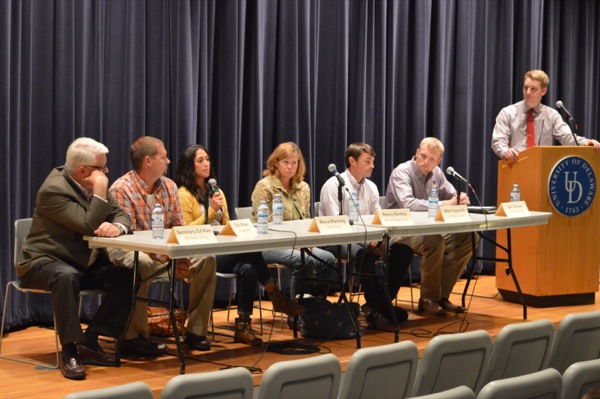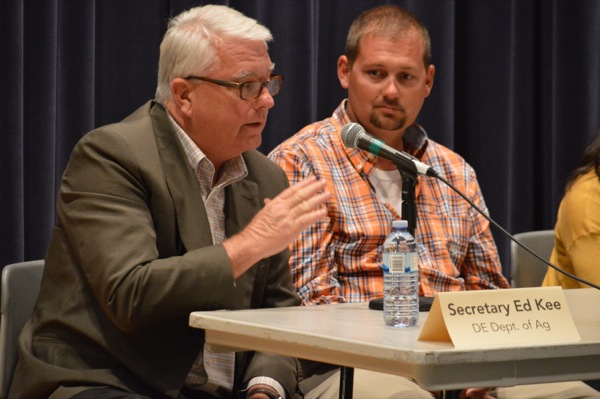


Farmland discussion
Farmers, growers talk about challenges facing the agriculture industry
4:45 p.m., Oct. 8, 2015--Members of the University of Delaware community, as well as regional farmers and growers, gathered Thursday, Oct. 1, at the Trabant University Center Theatre to view the documentary Farmland and listen to a panel discussion from industry experts about challenges facing the agriculture industry.
The panel discussion and the documentary screening were hosted by the Alpha Gamma Rho fraternity with the panel discussion moderated by Weber Stibolt, a senior majoring in food science in UD’s College of Agriculture and Natural Resources (CANR).
People Stories
'Resilience Engineering'
Reviresco June run
Panelists included:
- Ed Kee, Delaware secretary of agriculture;
- Mike Popovich, natural resource manager at CANR;
- Chris Magee, a fifth generation Sussex County farmer from Magee Farms;
- Nancy Bentley, owner of Fair Weather Farm, an organic operation in Fair Hill, Maryland;
- Becca Manning, manager of Historic Penn Farm in New Castle; and
- Sam Knauss, a student from Kansas State University who is interning with Monsanto Co.
The panelists all agreed that the movie showed an accurate depiction of what it’s like to be a farmer in America and touched on the different aspects associated with farming.
Family farms
One such aspect was how many of the farms featured in the film were owned and operated by families.
Kee said family farms are especially prevalent in Delaware.
“People hear about corporate farms; well, families incorporate for legal reasons, liability reasons, but they are a family unit no question about it. Even our large poultry companies — Perdue, Mountaire — they’re owned by families and that’s part of the success story of American agriculture and Delaware agriculture. Farmers are independent, they’re resilient, they know how to cope with stress, and I think the family structure fosters that ability to be resilient and independent,” Kee said.
With so many farms being inherited and run by families, Popovich said that it can be hard to break into the farming industry for a first generation farmer.
Kee pointed out that the Delaware Department of Agriculture has a young farmers program designed to help young farmers acquire farmland through a long-term, no-interest loan.
Knauss added that his family farm has benefited from United States Department of Agriculture (USDA) programs as well.
“I did go through the USDA to make some capital improvements on a lot of the machinery we have. We wouldn’t be able to do it without those programs. They’re definitely there; you just have to find them and know about it,” Knauss said.
Organic vs. GMO
Another topic that was discussed was organic farming versus conventional farming.
Bentley said that when she started learning about the number of chemicals that can be put upon plants and the ground, she found it mindboggling.
“My thought process is for every chemical you’re going to put on something, it’s going to have some adverse effect on something else, whether it’s another plant or people or nature,” Bentley said, adding that her belief is nature will figure out how to problem solve.
“I believe strongly that I’m doing the right thing by not interfering with what nature is trying to do,” she said.
Popovich said that he is making the transition to organic mainly because of the education component for interns and student workers.
Magee said he believes that there is a place for both organic and conventional farming, especially with the world population increasing.
“If the world population keeps going up, you’re not going to do it with conventional seed -- not with the acreage, the houses and the housing developments that we’re building. We have to do more with less,” Magee said.
Kee said that he sees agriculture as a big tent with room for everybody.
“There is certainly room for organic and non-organic. There is a need for each; there is a demand for each, and I think the markets kind of figure all that out. The organic growers find a market, and the conventional growers find a market,” he said.
Women in ag
The panel also talked about the importance of women in agriculture, with Bentley saying that she thinks more women are getting into agriculture because “we need to feed people real food from the ground, and I think there are more women getting into it because they see illness, disease, and health is basically through nutrition and getting good food.”
Manning said that after graduating from UD with a degree in wildlife conservation and ecology, she got into agriculture in order to be a good steward to the land.
“Now it’s really nice because I get to work closely with high school students so I work closely with the land. I’m growing food but I also get to be an educator and try to reach out to a younger generation to instill in them the importance of why eating healthy is important, what agriculture is, and where your food comes from. I’m not trying to make them a farmer per se but to try to open their eyes to all the different kinds of careers that can come out of agriculture in general,” said Manning.
Feeding the world
The need to feed an increasing world population was also a key theme with Knauss stressing the need to get simple technologies — such as tractors and fertilizers — as well as advanced technologies —such as apps to help with how much fertilizer to apply — to growers in developing countries.
Kee said that he wanted to leave the audience with the fact that, in 1960, there were three tillable acres available for every citizen in the world for food and by 2040 or 2050, that’s going to be down to one acre for every citizen of the world.
“I think that illustrates the need to grow more with less and technology’s going to be a part of that,” he said, adding that he wonders if his five grandchildren will have the food options that were available to him during his lifetime.
“Will it be abundant? Will they have all the choices? I hope so, and the reason I bring that up is that it’s wonderful to come on campus and see so many agricultural students engaged in this, but the other piece is every farmer is precious and every acre is critical here in Delaware and Delmarva and the world,” Kee said.
Article by Adam Thomas
Photos by Jackie Arpie









